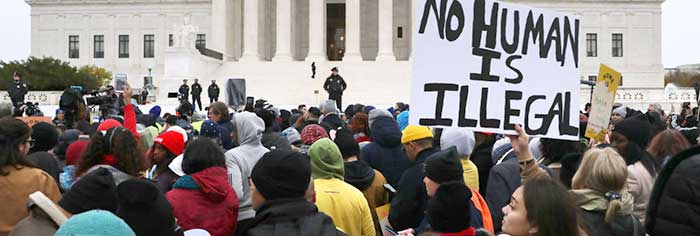
A single Supreme Court decision doesn’t say who we are as a country—but how we react to it might. Before long, U.S. Supreme Court justices will rule on the fate of about 650,000 undocumented immigrants who are waiting anxiously. They have been protected by DACA, the Obama-era Deferred Action for Childhood Arrivals program.
But if the court upholds President Donald Trump’s 2017 executive order to terminate the program, many of those young adults will lose their work visas, end their studies, and be deported. Their offense? Being brought to the United States as children by their parents.
The stakes are high and the timing is terrible, not only for the “Dreamers”—as they’re often called in reference to a once-popular congressional legislative fix named for the American Dream that languished as the country grew polarized—but for our nation in a time of crisis. The DACA threat has added another layer of grief and turmoil as we struggle with the coronavirus, record job losses, and racially motived police brutality that has prompted mass demonstrations, protests, and marches.
It’s time to heal, not divide. DACA is about fundamental fairness—the kind we’re fighting for across the nation as we have awakened to racial justice concerns following George Floyd’s death at the hands of Minnesota police. In both instances, people are suffering from systemic racism rooted in our nation’s history and kept alive through unjust public policies, beliefs, and actions that target people of color.
DACA recipients are essential workers
Instead of sending these immigrants to countries they barely know, we should keep them here to help us build a better future. In fact, about 200,000 of them are essential workers during the pandemic. A group of 27,000 who work on the front lines as doctors, nurses, and physician assistants sent a letter to the Supreme Court, arguing that ending DACA “during this national emergency would be catastrophic.”
As Los Angeles physical therapist Veronica Velasquez recently told USA Today, “I am treating people suspected of having COVID-19, and all I’m asking is to stay in this country and provide that care.”
DACA began as a straightforward plan under President Barack Obama in 2012: People brought into the country illegally as children and posing no security threat were granted temporary, but renewable, permission to remain here. DACA does not grant amnesty, award green cards, or confer U.S. citizenship. It simply requires immigration officials to decline to depart people who do not have legal status to be here through no fault of their own.
To be eligible, immigrants had to arrive here before they turned 16 and before June 15, 2020, avoid significant criminal convictions and pose no threat to national security, and be enrolled in school or either graduated from high school or earned a GED or honorably discharged from the U.S. military or Coast Guard. Many of them went on to college or are still enrolled, and some are nearly 40 today.
Saying Obama had exceeded his authority, Trump announced an end to the program three years ago. Since then, DACA supporters have battled in lower courts to keep it in place. As the dispute arrived at the Supreme Court, with a decision expected as soon as this month and no later than Oct. 4, DACA students and others feared the disruption of their lives and futures.
Major economic contributions
On the side of 650,000 DACA recipients are a host of states, universities, and scores of the nation’s largest businesses, including Google, Amazon, IBM, and Starbucks, which assert ending the program will hurt the economy.
These companies and so many other people are right. Our nation has an urgent need for skilled workers, and rebuilding the post-pandemic economy will take every bit of talent we can find.
DACA recipients already contribute in major ways to the economy. The Center for American Progress found that DACA families have $24.1 billion in spending power and pay $5.7 billion in federal taxes annually, as well as an additional $3.1 billion in state and local taxes.
Yet our approach to immigration is stuck in the past and focused on hot-button issues such as border security. For instance, many complain that immigrants take jobs that Americans want, but the data show that’s just not true. They actually fill unmet needs—not only with jobs at the low end, such as basic labor, but also in technology and advanced medical fields.
No matter the outcome, one court case won’t resolve this. As the country unites to address its longstanding racial inequities, we should consider the treatment of these endangered, hopeful Americans. We must remove the barriers of misunderstanding and help people gain active citizenship, contribute their talents, and live without fear. It’s in their interest, certainly—and just as surely in ours as well.
Jamie Merisotis is president and CEO of Lumina Foundation, an independent, private foundation in Indianapolis that is committed to making opportunities for learning beyond high school available to all. He previously wrote about DACA in an October 2019 opinion piece published in The Hill.
